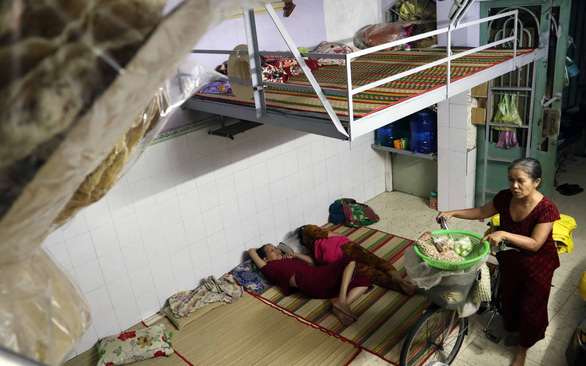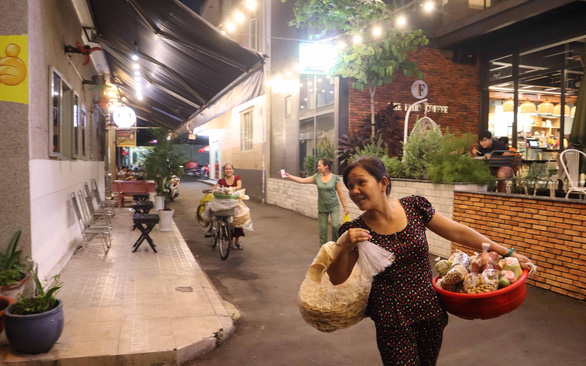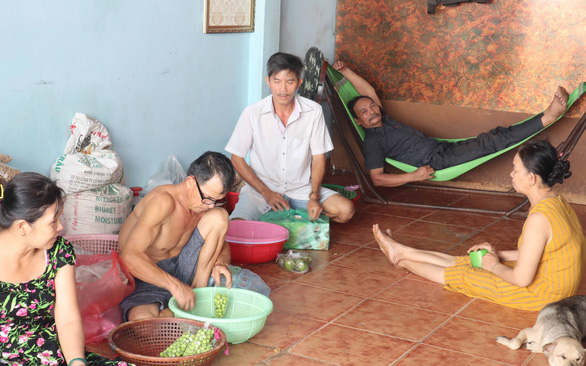It may not be ideal accommodations, but migrant workers from around Vietnam have no choice but to leave their hometowns only to end up in cramped houses which they share with other workers from around the country at minimal fees to eke out a living in Ho Chi Minh City.
Many migrant laborers, including those who left for the city for the chance to make a better living more than ten years ago, are resigned to cramped accommodations that may house up to 20 people at one time.
It is not comfortable to spend the night on a sedge mattress next to someone other than one's family and share the bathroom, but the discomfort is offset by the low rates, ranging from VND8,000 (US$0.3) to VND20,000 ($0.9) per night.
Such accommodations can be found in several places throughout Ho Chi Minh City, including Tan Phu District.
|
|
| Nguyen Thi Loan, a subtenant at a cheap shared home, is seen hawking snacks at night in Tan Phu District, Ho Chi Minh City, Vietnam. Photo: Le Van / Tuoi Tre |
Boons to laborers
At midnight, Nguyen Thi Le, who makes a living hawking snacks on the streets around the district including Tan Son Nhi, Go Dau, and Truong Vinh Ky, has yet to call it a day.
The streets are lined with pubs, karaoke parlors, and eateries which remain open throughout the night in recent years.
Le’s and her two other fellow vendors’ wares include boiled quail eggs, roasted peanuts, rice papers, and cubed fruits, which pair well with beer and are quite popular with Vietnamese drinkers.
Despite having a bad cough, Le disappeared into the night with her loaded basket, determined to sell her wares.
“She won’t call it a day until her basket is empty. There are nights in which we don’t get back to our rented room until four in the morning,” Trang Thi Tam, 65, one of Le’s colleagues, said.
At 2:30 that night, Le finally pushed her bicycle into the rented home, nestled in Go Dau Street.
Her landlords, who are also from Le’s hometown, have rented the entire house and sublet it to their fellowmen for over the past 10 years.
The utilitarian residence typically houses 10 subtenants and up to 20 in peak times.
“Only six of us stay here these days, as others have come back to their hometown for Tet Doan Ngo [a traditional Chinese-origin holiday]. The house turns more spacious but less cosy than usual,” Le shared.
They pay a mere VND12,000 ($0.5) to VND20,000 each night for accommodations, electricity, and water.
What makes this type of lodging even more special is that payment is made for each night subtenants spend, with no down payment required, which allows them to move to other places easily, according to Nguyen Ten, another landlord with similar arrangements.
Other landlords offer even more competitive prices, at just VND8,000 to VND10,000 ($04) each night, Nguyen Thi Thao, 41, said about her rented abode on Nguyen Lo Trach Street in the same district.
With a crippled leg, Thao painstakingly spends her days rolling through streets, constantly on the lookout for anyone who might want to buy the lottery tickets she sells to bring in some cash to provide for herself and support her family back home.
The clientele of such accommodation providers are not limited to migrant laborers, most of whom hail from central provinces including Phu Yen and Quang Ngai.
Students and office workers also make up the subtenant list at a house on Phung Chi Kien Street in Tan Phu District, for similar rates.
As the landlord and the subtenants are from the same village or commune, they are helpful and sympathetic while earning a living in the southern metropolis.
“When we first made our way to Ho Chi Minh City 30 years ago, we got by quite well and even ran our own company. But then things got tough and we ended up subletting the house we ourselves are renting,” Dinh Hung Thai, 47, from Quang Ngai Province, opened up about why he came to sublease the house snuggled in an alley on Go Dau Street.
Thai is a go-between who purchases quail eggs and peanuts from wholesalers and sells to his subtenants.
|
|
| The cosy atmosphere at a cheap shared home in Tan Phu District, Ho Chi Minh City, Vietnam, with subtenants being helpful and tolerant toward one another while living temporarily under the same roof. Photo: Le Van / Tuoi Tre |
'Thank you, Saigon!'
According to Nguyen Tan Manh, 47, a patron at Ten’s house in Phung Chi Kien Alley, most of such accommodation providers were hungry for clients while the entire country was hunkering down during the COVID-19 pandemic and when the social distancing order was in place.
“We are normally packed like sardines, but only my landlord and his wife stayed then, waiting for clients to come back when the pandemic is over,” he said.
Another resident at one of these accommodation providers in Phung Chi Kien Alley is 53-year-old Nguyen Thi Loan, who left her hometown in Quang Ngai Province 16 years ago.
Like many others in her hometown, she only returned home to help with harvests in March and August each year, while spending the remaining months peddling wares or doing odd jobs around Ho Chi Minh City.
“It’s really tough to eke out a living but we are still thankful to Saigon, where I can work to support my elderly mother back home,” the woman, who juggled peddling and doing the dishes at an eatery, said, referring to the old name of the city still popular with locals now.
She added most of the money she has sent home comes from the savings after staying at the cheap abode for all these years.
The subtenants are not only nagged by worries about making a living but also cherish hopes for a brighter future for the next generation.
“All the money I save goes to meals and tuition fees for my two school-age children and the eldest one who has just entered a medical college in Quang Ngai. It would be a tough road ahead,” Manh admitted.
Tran Ngoc Man, 36, who left his hometown in Phu Yen Province almost 20 years ago, revealed he rents a house on Nguyen Lo Trach Street in Tan Phu District for nearly VND10 million ($429) a month and subleases it to up to 20 fellowmen at a time.
His subtenants get accommodations and two meals each day for only VND8,000-10,000 each night.
He also sells lottery tickets to the subtenants and pockets merely a minute surplus.
Like us on Facebook or follow us on Twitter to get the latest news about Vietnam!





















































